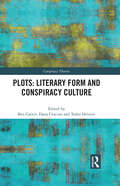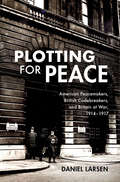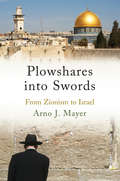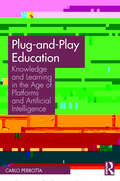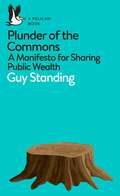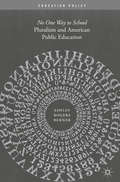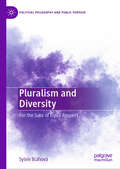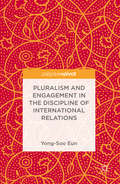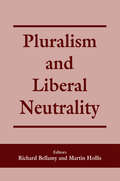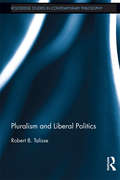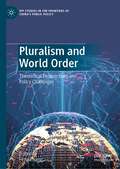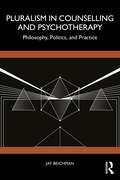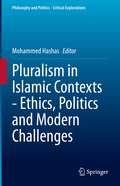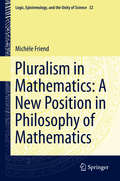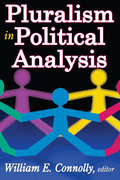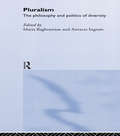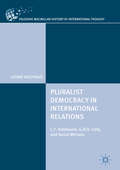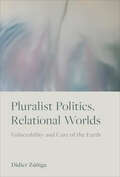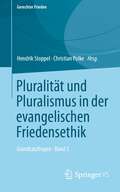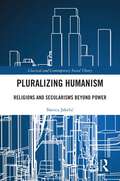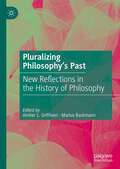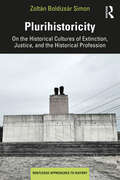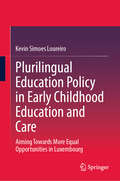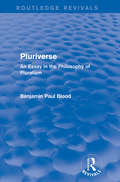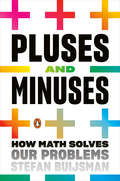- Table View
- List View
Plots: Literary Form and Conspiracy Culture (Conspiracy Theories)
by Ben CarverThis edited collection contributes to the study of conspiracy culture by analysing the relationship of literary forms to the formation, reception, and transformation of conspiracy theories. Conspiracy theories are narratives, and their narrative form provides the structure within which their ‘readers’ situate themselves when interpreting the world and its history. At the same time, conspiracist interpretations of the world may then be transmediated into works of literature and import popular discourse into narrative structures. The suppression and disappearance of books themselves may generate conspiracy theories and become co-opted into political dissent. Additionally, literary criticism itself is shown to adopt conspiracist modes of interpretation. By examining conspiracy plots as literary plots, with narrative, rhetorical, and symbolic characteristics, this volume is the first systematic study of how conspiracy culture in American and European history is the consequence of its interactions with literature. This book will be of great interest to researchers of conspiracy theories, literature, and literary criticism.
Plotting for Peace: American Peacemakers, British Codebreakers, and Britain at War, 1914–1917
by Daniel LarsenWith Britain by late 1916 facing the prospect of an economic crisis and increasingly dependent on the US, rival factions in Asquith's government battled over whether or not to seek a negotiated end to the First World War. In this riveting new account, Daniel Larsen tells the full story for the first time of how Asquith and his supporters secretly sought to end the war. He shows how they supported President Woodrow Wilson's efforts to convene a peace conference and how British intelligence, clandestinely breaking American codes, aimed to sabotage these peace efforts and aided Asquith's rivals. With Britain reading and decrypting all US diplomatic telegrams between Europe and Washington, these decrypts were used in a battle between the Treasury, which was terrified of looming financial catastrophe, and Lloyd George and the generals. This book's findings transform our understanding of British strategy and international diplomacy during the war.
Plowshares into Swords: From Zionism to Israel
by Arno J. MayerThis rich, authoritative history chronicles the Zionist Israeli quest from itsorigins in pre-Great War Europe. Plowshares Into Swords traces the development of political Zionism's primal resolve to implant a state for Jews in a Middle East of ever greater strategic importance. In it, Mayer provides newperspectives on key turning points as well as on such enduring issues as the young country's dire need for imperial protection, the oil imperative, the hidden ascendance of Jabotinsky's martial and expansionist canon, and reliance on the American Jewish and Christian evangelical lobbies. He examines, too, the post-colonial backlash against Western supremacy, the asymmetry of power between Israelis and Palestinians, the Zionist Israeli leaders studied prevarication on borders, and the emergence of political Judaism and political Islam.Incorporating reflections on founding violence, sovereignty, resistance, terror, and religious politics, Plowshares into Swords is an absorbing, challenging narrative of Zionism and Israel in the context of world history.
Plug-and-Play Education: Knowledge and Learning in the Age of Platforms and Artificial Intelligence
by Carlo PerrottaPlug-and-Play Education: Knowledge and Learning in the Age of Platforms and Artificial Intelligence documents and critiques how the education sector is changing with the advancement of ubiquitous edtech platforms and automation. As programmability and computation reengineer institutions towards efficiency and prediction, the perpetual collection of and access to digital data is creating complex opportunities and concerns. Drawing from research into secondary and higher education settings, this book examines the influence of digital “infrastructuring”, the automation of teaching and learning, and the very purpose of education in a context of growing platformisation and artificial intelligence integration. These theoretical, practical, and policy-oriented insights will offer educational technologists, designers, researchers, and policymakers a more inclusive, diverse, and open-ended perspective on the design and implementation of learning technologies.
Plunder of the Commons: A Manifesto for Sharing Public Wealth (Pelican Books)
by Guy Standing'One of the most important books I've read in years' Brian EnoWe are losing the commons. Austerity and neoliberal policies have depleted our shared wealth; our national utilities have been sold off to foreign conglomerates, social housing is almost non-existent, our parks are cordoned off for private events and our national art galleries are sponsored by banks and oil companies. This plunder deprives us all of our common rights, recognized as far back as the Magna Carta and the Charter of the Forest of 1217, to share fairly and equitably in our public wealth.Guy Standing leads us through a new appraisal of the commons, stemming from the medieval concept of common land reserved in ancient law from marauding barons, to his modern reappraisal of the resources we all hold in common - a brilliant new synthesis that crystallises quite how much public wealth has been redirected to the 1% in recent decades through the state-approved exploitation of everything from our land to our state housing, health and benefit systems, to our justice system, schools, newspapers and even the air we breathe. Plunder of the Commons proposes a charter for a new form of commoning, of remembering, guarding and sharing that which belongs to us all, to slash inequality and soothe our current political instability.
Pluralism and American Public Education
by Ashley Rogers BernerThis book argues that the structure of public education is the main reason America's public education system is failing to fulfill the intellectual, civic, and moral aims for which it was created. The book challenges the philosophical basis for the traditional common school model and defends the educational pluralism that most liberal democracies enjoy. Berner provides a unique theoretical pathway that is neither libertarian nor state-focused and a pragmatic pathway that avoids the winner-takes-all approach of many contemporary debates about education. For the first time in nearly one hundred fifty years, changing the underlying structure of America's public education system is both plausible and possible, and this book attempts to set out why and how.
Pluralism and Diversity: For the Sake of Equal Respect (Political Philosophy and Public Purpose)
by Sylvie BláhováThis book examines what the justification of political power and the character of a liberal political community in the conditions of pluralism should look like, with the aim of equal respect for all. Sylvie Bláhová argues that if those who understand the principle of respect as the basis of political liberalism are to fulfill all the prerequisites of this principle, they must ensure respect within the liberal political community as a whole. The classic interpretation of political liberalism ensures respect during the process of justification of political power, yet many individuals in the liberal political community remain disrespected, mainly due to their group membership. Accordingly, Bláhová looks for a more complex interpretation of the principle of respect within political liberalism, one that ensures respect beyond the justification of political power. The author argues that the way to achieve respect in the liberal political community is to interpret the criterion of reciprocity in a dual way. Specifically, Bláhová claims that respect can be ensured only in conjunction with the principle of civic friendship, which makes respect more comprehensive. This novel interpretation can ensure unity of the liberal political community and make it stable, which is crucial in conditions of pluralism.
Pluralism and Engagement in the Discipline of International Relations
by Yong-Soo EunThis book identifies and addresses subtle but important questions and issues associated with the configuration of International Relations as a discipline. Starting with a much-needed discussion of manifold implications and issues associated with pluralism, the book raises important questions, such as where does the field of IR stand in terms of epistemological, theoretical, and methodological diversity. The book also carries out a comparative analysis of the present status of post-positivist IR scholarship in the United States and China. Eun discusses these questions through a close reading of the key texts in the field and by undertaking a critical survey of publishing and teaching practices in IR communities. IR scholars will gravitate to this text that fills many gaps in international political theory.
Pluralism and Liberal Neutrality
by RICHARD BELLAMY; MARTIN HOLLISThe crisis of liberalism is in its claim to endorse neutral procedures that allow individuals and groups to pursue their own good, when the very possibility of such neutrality is affected by the growth of plural societies, and resulting divisions of loyalty. This collection explores this crisis.
Pluralism and Liberal Politics (Routledge Studies in Contemporary Philosophy)
by Robert TalisseIn this book, Robert Talisse critically examines the moral and political implications of pluralism, the view that our best moral thinking is indeterminate and that moral conflict is an inescapable feature of the human condition. Through a careful engagement with the work of William James, Isaiah Berlin, John Rawls, and their contemporary followers, Talisse distinguishes two broad types of moral pluralism: metaphysical and epistemic. After arguing that metaphysical pluralism does not offer a compelling account of value and thus cannot ground a viable conception of liberal politics, Talisse proposes and defends a distinctive variety of epistemic pluralism. According to this view, certain value conflicts are at present undecidable rather than intrinsic. Consequently, epistemic pluralism countenances the possibility that further argumentation, enhanced reflection, or the acquisition of more information could yield rational resolutions to the kinds of value conflicts that metaphysical pluralists deem irresolvable as such. Talisse’s epistemic pluralism hence prescribes a politics in which deep value conflicts are to be addressed by ongoing argumentation and free engagement among citizens; the epistemic pluralist thus sees liberal democracy is the proper political response to ongoing moral disagreement.
Pluralism and World Order: Theoretical Perspectives and Policy Challenges (IPP Studies in the Frontiers of China’s Public Policy)
by Feng ZhangThis volume explores the implications of pluralism for international order. Distinguished contributors from around the world offer insights into the character of a pluralistic world order. They focus especially on the manifestations of international pluralism in great power relations, multilateralism, and regionalism. Contributors examine the myriad challenges a pluralistic world order will face in the years ahead, yet they eschew alarmist conclusions. There is still scope for the great powers to better manage their relations, and equally important, much space for multilateralism and regionalism to play their increasingly important roles in stabilizing world order. Distinctive in bringing the themes of pluralism and world order together in both theoretical exposition and policy discussion, this book offers a stimulating reading for scholars and practitioners of world politics.
Pluralism in Counselling and Psychotherapy: Philosophy, Politics, and Practice
by Jay BeichmanThis book explores the concept of pluralism in therapy, emphasising the value of multiple therapeutic approaches. It introduces ‘pluralistic therapy’, developed by Mick Cooper and John McLeod, as a response to divisions in the therapy field, particularly the dominance of CBT and medicalised models.Within its chapters, the philosophical roots of pluralism are discussed, which, when applied to therapy, encourage drawing from multiple approaches in contrast to a monistic attitude, which promotes using singular approaches ‘purely’: the therapeutic relationship is emphasised as more important to outcomes than specific approaches or techniques. The political meanings of pluralism are also examined, especially in relation to regulation, professional identity, and the impact of political and professional power structures on therapists’ practices. The book also critiques increasingly standardised ‘treatments’, AI therapy, and rigid research methodologies, advocating for a more inclusive, relational, and flexible attitude towards the practice and provision of therapy.Addressing contemporary challenges such as the SCoPEd framework, the rise of AI, and the resurgence of psychedelic therapies, the book ultimately argues that a philosophically and politically informed pluralism is essential for a brighter future for the therapy professions and their diversity of therapies, therapists, and clients. This is an essential read for any therapist or mental health practitioner who is interested in learning more about pluralistic approaches to therapy.
Pluralism in Islamic Contexts - Ethics, Politics and Modern Challenges (Philosophy and Politics - Critical Explorations #16)
by Mohammed HashasThis book brings together international scholars of Islamic philosophy, theology and politics to examine these current major questions: What is the place of pluralism in the Islamic founding texts? How have sacred and prophetic texts been interpreted throughout major Islamic intellectual history by the Sunnis and Shi‘a? How does contemporary Islamic thought treat religious and political diversity in modern nation states and in societies in transition? How is pluralism dealt with in modern major and minor Islamic contexts? How does modern political Islam deal with pluralism in the public sphere? And what are the major internal and external challenges to pluralism in Islamic contexts? These questions that have become of paramount relevance in religious studies especially during the last three-four decades are answered as critically highlighted in Islamic founding sources, the formative classical sources and how it has been lived and practiced in past and present Islamic majority societies and communities around the world. Case studies cover Egypt, Turkey, Indonesia, and Thailand, besides various internal references to other contexts.
Pluralism in Mathematics: A New Position in Philosophy of Mathematics
by Michèle FriendThis book is about philosophy, mathematics and logic, giving a philosophical account of Pluralism which is a family of positions in the philosophy of mathematics. There are four parts to this book, beginning with a look at motivations for Pluralism by way of Realism, Maddy's Naturalism, Shapiro's Structuralism and Formalism. In the second part of this book the author covers: the philosophical presentation of Pluralism; using a formal theory of logic metaphorically; rigour and proof for the Pluralist; and mathematical fixtures. In the third part the author goes on to focus on the transcendental presentation of Pluralism, and in part four looks at applications of Pluralism, such as a Pluralist approach to proof in mathematics and how Pluralism works in regard to together-inconsistent philosophies of mathematics. The book finishes with suggestions for further Pluralist enquiry. In this work the author takes a deeply radical approach in developing a new position that will either convert readers, or act as a strong warning to treat the word 'pluralism' with care.
Pluralism in Political Analysis
by Francis A. O'ConnellThe theory of democratic pluralism has long provided the dominant ideal and description of politics in industrial societies with competing party systems. The purpose of this classic collection, including some of the leading theorists of the late 1960s, is to subject this theory to systematic scrutiny. The authors examine the work of such pluralists as Robert Dahl, David Truman, Adolf Berle, Arthur Bentley, Joseph Schumpeter, and Walter Lippmann, as well as of such critics of pluralist theory as C. Wright Mills, Herbert Marcuse, Henry Kariel, and Grant McConnell.Voicing the respective points of view of science, economics, philosophy, and psychology, the authors converge in their agreement that the conventional, pluralist interpretation of contemporary politics requires significant revision. The views of these diverse critics coalesce into the outline of what they see as a more enlightened political ideal and a more relevant descriptive theory. This collective portrait offers a provocatively new interpretative framework for the understanding of the politics of contemporary industrial society.Connolly includes a sophisticated discussion of such concepts as power, decision-making, politics, and interest groups and devotes considerable attention to the need to promote positive change, particularly where the pluralist system shows bias against certain segments of society as well as against some dimensions of social life affecting everyone's existence in the society. Intended for use in Comparative Government, Contemporary Political Theory, Political Parties and Pressure Groups, and advanced courses in American Government, this volume remains a challenging resource for those dealing with the nature and possible change of the organization of contemporary democratic society.
Pluralism: The Philosophy and Politics of Diversity
by Maria Baghramian and Attracta IngramCultural, moral and religious diversity is a pervasive feature of modern life, yet has only recently become the focus of intellectual debate. Pluralism is the first book to tackle philosophical pluralism and link pluralist themes in philosophy to politics. A range of essays investigates the philosophical sources of pluralism, the value of pluralism and liberalism, and difference in pluralism, including writings on women and the public-private distinction.This is a valuable source for students of philosophy, politics and cultural studies.
Pluralist Democracy in International Relations: L. T. Hobhouse, G. D. H. Cole, And David Mitrany (The\palgrave Macmillan History Of International Thought Ser.)
by Leonie HolthausThis book demonstrates the importance of democracy for understanding modern international relations and recovers the pluralist tradition of L.T. Hobhouse, G.D.H. Cole, and David Mitrany. It shows that pluralism’s typical interest in civil society, trade unionism, and transnationalism evolved as part of a wide-ranging democratic critique that representative democracies are hardly self-sustaining and are ill-equipped to represent all entitled social and political interests in international relations. Pluralist democratic peace theory advocates transnational loyalties to check nationalist sentiments and demands the functional representation of social and economic interests in international organizations. On the basis of the pluralist tradition, the book shows that theories about domestic democracy and international organizations co-evolved before scientific liberal democratic peace theory introduced new inside/outside distinctions.
Pluralist Politics, Relational Worlds: Vulnerability and Care of the Earth
by Didier ZúñigaIn Pluralist Politics, Relational Worlds, Didier Zúñiga examines the possibility for dialogue and mutual understanding in human and more-than-human worlds. The book responds to the need to find more democratic ways of listening to, giving voice to, and caring for the variety of beings that inhabit the earth. Drawing on ecology and sustainability in democratic theory, Zúñiga demonstrates the transformative potential of a relational ethics that is not only concerned with human animals, but also with the multiplicity of beings on earth, and the relationships in which they are enmeshed. The book offers ways of cultivating and fostering the kinds of relations that are needed to maintain human and more-than-human diversity in order for life to persist. It also calls attention to the quality of the relationships that are needed for life to flourish, advancing our understanding of the diversity of pluralism. Pluralist Politics, Relational Worlds ultimately presses us to question our own condition of human animality so that we may reconsider the relations we entertain with one another and with more-than-human forms of life on earth.
Pluralität und Pluralismus in der evangelischen Friedensethik: Grundsatzfragen • Band 5 (Gerechter Frieden)
by Christian Polke Hendrik StoppelDieses Buch thematisiert Pluralität und Pluralismus in der evangelischen Friedensethik. Denn die Kirche kann nur und muss letztendlich im Rahmen des politischen und weltanschaulich-religiösen Pluralismus agieren. Ob sie dabei selbst als eine einheitliche Stimme auftreten soll, ist Gegenstand der Diskussion. Sie selbst ist schließlich intern immer schon plural verfasst, gesellschaftlich aber eben auch die Kirche. Das verschärft die Frage nach der Stimme der Kirche: Geht ihren Äußerungen ein interner Klärungsprozess voraus, der den inneren Pluralismus zu eben jener einen Stimme zusammenführt oder nimmt die Kirche in Form mehrerer einzelner Stimmen am pluralistischen Konzert teil? Diese Fragen beantwortet der Sammelband aus verschiedenen, nicht nur kirchlichen, Perspektiven.
Pluralizing Humanism: Religions and Secularisms Beyond Power (Classical and Contemporary Social Theory)
by Slavica JakelićHumanism is appealed to today whenever we want to tackle the conditions of dehumanization in the contemporary world. But for humanism to be viable in the twenty first century, this book argues, it needs to be pluralized.Employing theoretical, historical, and sociological arguments, this book moves beyond the discourse of critique. It engages theories of religion and secularism, as well as postmodern, postcolonial, and decolonial critiques of Western humanist projects, to uncover the ideas and practices of religious and secular humanisms when they challenge dehumanization in the pursuit of conditions of flourishing for all. Through studies of the Solidarity movement in Poland and the anti-apartheid movement in South Africa, the book demonstrates the centrality of humanist traditions to the emergence of religious-secular solidarities that transformed the political landscapes of the world. By highlighting the instances in which humanisms functioned as checks on each other’s absolutist claims, the book contends that humanisms supply a constructive path for addressing the challenges of our time—a time of radically divided societies and intolerant, even violent, forms of nationalism. A challenge to the critiques of humanism that seek to identify it solely as the legacy of the West, as anti-religious discourse, or relegate it to the domain of power constellations, Pluralizing Humanism highlights the rich plurality of humanist discourses and the need for their mutual engagements. It points to humanist ideals as constitutive of politics that can guide our human power because they are irreducible to it.As such, this book will appeal to social scientists, social theorists, religious studies scholars, and ethicists with interests in religion, secularism, social movements, and humanist thought and practice.
Pluralizing Philosophy’s Past: New Reflections in the History of Philosophy
by Amber L. Griffioen Marius BackmannThis collection of 15 accessible essays on neglected philosophical figures and traditions aims to provide readers with concrete access points to less familiar philosophical sources and methods. Showcasing the latest research by both up-and-coming and well-established scholars, each essay focuses on a particular topic relevant to the pluralization of the history of philosophy and offers advice for incorporating the figure, theme, or approach into the philosophy classroom.
Plurihistoricity: On the Historical Cultures of Extinction, Justice, and the Historical Profession (Routledge Approaches to History)
by Zoltán Boldizsár SimonThis book situates historical scholarship within a plurihistoricity of contemporary historical culture, exploring conflicting conceptions of historical change in technological utopias of human enhancement, in prospects of human extinction, in societal responses to the Anthropocene, and in the imperative of bringing colonial patterns of historical injustice to justice.Contemporary societies increasingly reclaim history from the academic pursuit of historiography. On the one hand, societal engagement in history is growing palpably. History is literally everywhere: in the fallen statues of past political regimes, in trajectories of environmental degradation, and in technological prospects of space expansion. On the other hand, societal demand for history seems to diminish rather than strengthen the authority of professionalized historical studies. What do these societal historicities stand for? How do they create pasts that matter? What futures do they desire or attempt to avoid? How do they view the historical transitions into those futures? And what is the societal role of historical scholarship and scholarly conceptions of history in the plurihistoricity of contemporary historical culture?By addressing these questions, Simon’s book is essential reading for everyone interested in the present and future of viewing the world historically.
Plurilingual Education Policy in Early Childhood Education and Care: Aiming Towards More Equal Opportunities in Luxembourg
by Kevin Simoes LoureiroThis book explores the implementation of educational policies aimed at addressing educational inequalities and specifically focuses on Luxembourg’s pioneering plurilingual education policy in non-formal early childhood education and care. It emphasizes the significance of developing plurilingual policies that accommodate diverse linguistic and organizational contexts, ensuring more effective implementation and equitable educational opportunities for all children. Through an in-depth analysis, this book provides insights into various aspects of policy implementation. It delves into the drivers and goals of the plurilingual policy, the measures taken to implement it, the challenges encountered, and the success factors identified at the policy level. Additionally, it examines the attitudes, intentions and obstacles faced by those involved at the practice level. Drawing on a range of theoretical frameworks and empirical studies, the book presents multiple perspectives on the subject. By employing a mixed-methods design, including policy document analysis of the plurilingual education program, expert interviews with policy-level stakeholders and a cross-sectional survey of early childhood practitioners in the non-formal education sector, this work offers a multifaceted approach. The book not only enhances the understanding of policy implementation processes, but also sheds light on the practical implications and potential for reducing educational inequalities in multilingual educational settings. The findings and discussions in this book are, thus, pertinent not only to Luxembourg, but also offer policy- and practice-related implications for similar educational contexts globally.
Pluriverse: An Essay in the Philosophy of Pluralism (Routledge Revivals)
by Benjamin Paul BloodPluriverse, the final work of the American poet and philosopher Benjamin Paul Blood, was published posthumously in 1920. After an experience of the anaesthetic nitrous oxide during a dental operation, Blood came to the conclusion that his mind had been opened, that he had undergone a mystical experience, and that he had come to a realisation of the true nature of reality. This title is the fullest exposition of Blood’s esoteric Christian philosophy-cum-theology, which, though deemed wildly eccentric by commentators both during his lifetime and later in the twentieth century, was nonetheless one of the most influential sources for American mystical-empiricism. In particular, Blood’s thought was a major inspiration for William James, and can be seen to prefigure the latter’s concept of Sciousness directly.
Pluses and Minuses: How Math Solves Our Problems
by Stefan BuijsmanA guide to changing how you think about numbers and mathematics, from the prodigy changing the way the world thinks about math.We all know math is important: we live in the age of big data, our lives are increasingly governed by algorithms, and we're constantly faced with a barrage of statistics about everything from politics to our health. But what might be less obvious is how math factors into your daily life, and what memorizing all of those formulae in school had to do with it. Math prodigy Stefan Buijsman is beginning to change that through his pioneering research into the way we learn math. Plusses and Minuses is based in the countless ways that math is engrained in our daily lives, and shows readers how math can actually be used to make problems easier to solve. Taking readers on a journey around the world to visit societies that have developed without the use of math, and back into history to learn how and why various disciples of mathematics were invented, Buijsman shows the vital importance of math, and how a better understanding of mathematics will give us a better understanding of the world as a whole. Stefan Buijsman has become one of the most sought-after experts in math education after he completed his PhD at age 20. In Plusses and Minuses, he puts his research into practice to help anyone gain a better grasp of mathematics than they have ever had.
